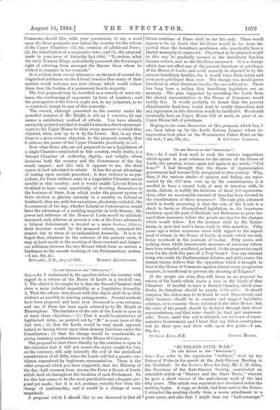[TO THE EDITOR OF THE " SPECTATOR."] SIR, —As I understand
it, the question before the country with regard to a reform of the House of Lords is a twofold one.
1. The object to be sought for is that the Second Chamber shall show a more judicial impartiality as a Legislative Assembly.
2. That the reform introduced with this object shall do as little violence as possible to existing arrangements. Several methods have been proposed and have been discussed in your columns, and one of them has been again referred to by Mr. Bright at Birmingham. The limitation of the rule of the Lords is open to at least three objections :—(1) That it would be productive of legitimised delay, as pointed out by " M." in your issue of the 2nd inst.; (2) that the Lords would be very much opposed, indeed, to having thrust upon them dummy functions under the Constitution ; (3) that the change would be considerable, as giving statutory predominance to the House of Commons.
The proposal to elect Peers directly by the counties is open to the objection that it will not secure the object sought for, but, on the contrary, will only intensify the evil of the prejudiced consideration of all Bills, since the Lords will feel a greater con- fidence engendered by legitimate representation. There is the other proposal which you have suggested, that the Ministry of the day shall summon from among the Peers a House of Lords which shall sit throughout the duration of each Parliament. So far this last seems to be the most practicable and adequate pro- posal yet made; but it is not, perhaps, entirely free from the charge of partisanship, and it would be a change of some magnitude.
A proposal which I should like to see discussed is that all future creations of Peers shall be for life only. There would appear to be no doubt that life-Peers would be far more im- partial than the hereditary gentlemen who practically have a landed monopoly to represent. The object to be attained would in this way be gradually secured as the hereditary families became extinct, and as the life-Peers increased. It is a change which does not affect any of the present functions or privileges of the House of Lords, and could scarcely be objected to by the present hereditary families, for it would leave them intact and even more privileged than ever. The change, too, would prove beneficial in other directions besides the one referred to. There has long been a feeling that hereditary legislators are an anomaly. The plan suggested by recruiting the Lords from the elected representatives in the House of Commons would rectify this. It would probably be found that the present objectionable land-laws would tend to rectify themselves, and any legislation in this direction would be facilitated. We should eventually have an Upper House full of merit, in place of an Upper House full of privileges.
Hoping to see some discussion of this proposal, which has, I see, been taken up by the Lords Reform League, whose in- auguration took place at the Westminster Palace Hotel on the


































 Previous page
Previous page